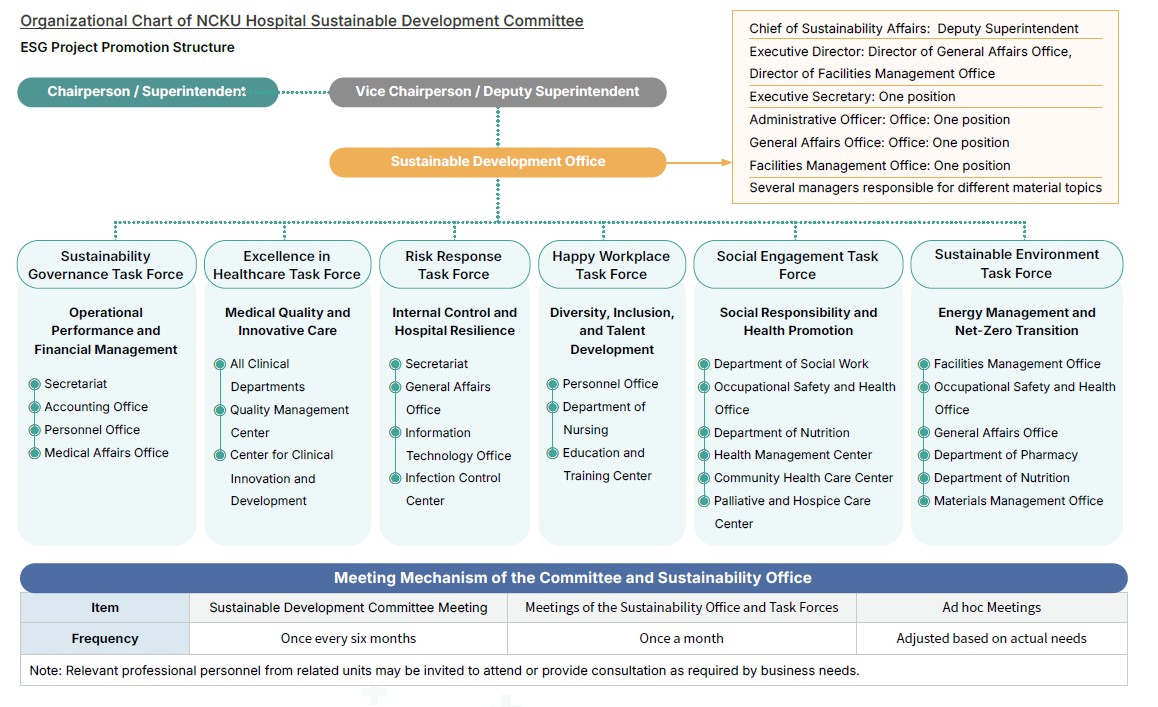Governance and Supervision
Governance and Supervision
-
Organizational Structure
To address diverse needs such as elderly care, pediatric critical care, smart healthcare, and disaster response, enhancing healthcare accessibility and social impact has become an essential component. NCKUH has developed a multi-campus structure with a clearly defined medical network system, which currently includes the main hospital, Douliu Branch, and the planned construction of the Geriatric Hospital and Shalun Hospital, gradually forming a regionally distinctive and functionally diverse medical system.

To support the effective operation of multi-campus medical services, National Cheng Kung University Hospital (NCKUH) has established a sound organizational structure and governance mechanism. With the goal of advancing medical service quality, patient safety, employee well-being, environmental sustainability, and effective organizational governance, NCKUH, in accordance with relevant regulations and healthcare institution governance principles, has set up a headquarters and various specialized units. It adopts an operational model of “comprehensive planning and specialized division,” promoting clinical healthcare, teaching and research, and quality improvement efforts. The current organizational structure includes 28 medical departments, 16 task centers, 3 medical affairs units, and 17 administrative departments. According to specialties, it has established 28 clinical and support units, such as the Department of Internal Medicine, Department of Surgery, Department of Obstetrics and Gynecology, and Department of Pediatrics. In addition, multiple cross-departmental professional centers have been established, such as the Cancer Center, Genetic Center, and Clinical Trial Center, to actively promote precision medicine, interdisciplinary integrated care, and clinical research development.
Furthermore, 38 dedicated hospital-wide committees have been formed as supervisory and management mechanisms, responsible for policy formulation, execution, and supervision. These committees comprehensively cover hospital operations, development strategies, medical quality, patient safety, innovation and research, and ESG-related topics. Each committee is convened by a member of the Office of the Superintendent, with senior executives or their representatives serving as committee members. Depending on the committee’s scope, data relevant to hospital management, patient safety, and medical quality are collected to ensure the safety and effectiveness of healthcare services and the overall efficiency of organizational operations. These efforts continue to refine the quality of medical services, enhance the hospital’s overall competitiveness, and fulfill its commitment to sustainable operations and social responsibility.
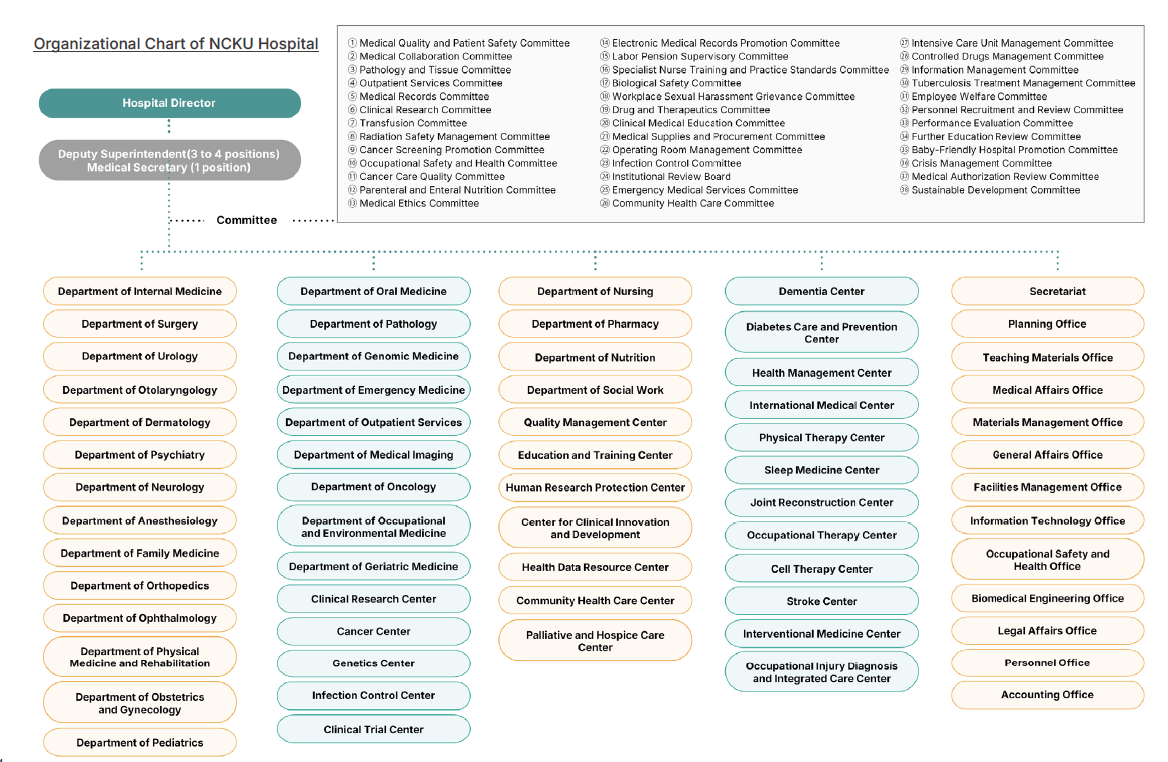
-
Supervisory Mechanism
National Cheng Kung University Hospital (NCKUH) is affiliated with the College of Medicine of National Cheng Kung University and serves as a vital base for its clinical education, medical services, and research development. The overall development direction of the Hospital not only aligns with clinical medical needs but also responds to the educational policies and strategic goals of both the College of Medicine and the University headquarters, demonstrating a high degree of integration and coordination between their governance structures. Although the Hospital is managed by an operating team, its highest-level guidance and supervision are carried out by a supervisory team established by National Cheng Kung University. This team reviews major changes, executive appointments, and operational plans in accordance with organizational regulations, and submits them to National Cheng Kung University for final approval, ensuring regulatory compliance and sustainable development.
The “Supervisory Team of Medical Institutions of National Cheng Kung University” is composed of two types of members: standing members and expert members.
The standing members are chaired by the University President and include representatives from the University, three impartial professionals from various fields, and one employee representative. The term of appointment is up to two years and may be renewed. Expert members are invited by the University President based on the theme of each supervisory and joint meeting to participate and provide key policy or project-related recommendations. Through participation in the University Affairs Meeting, Administrative Meeting, Executives Meeting, and University Development Committee of National Cheng Kung University, the supervisory team remains fully informed of overall university development planning. It also maintains close interactions with the College of Medicine’s Faculty Affairs Meeting and Administrative Executive Meetings, ensuring that the Hospital’s operational strategies align with the academic system’s development direction. The Superintendent and Deputy Superintendents also actively participate in various internal meetings, including the Faculty Affairs Meeting, Medical Affairs Meeting, and Executive Growth Camp. Meeting participants often have professional backgrounds in management, research and development, and information technology, enhancing foresight and execution in decision-making and strengthening the overall governance effectiveness.
In addition, the Hospital has established a “Joint Meeting” system, serving as a key communication and coordination platform between the supervisory and operating teams. It covers diverse topics such as patient-centered high-quality medical care, effective organizational management, interdisciplinary collaboration, enhancement of teaching quality, talent cultivation, smart healthcare, sustainable development, and innovative technologies, providing essential guidance for future development planning.
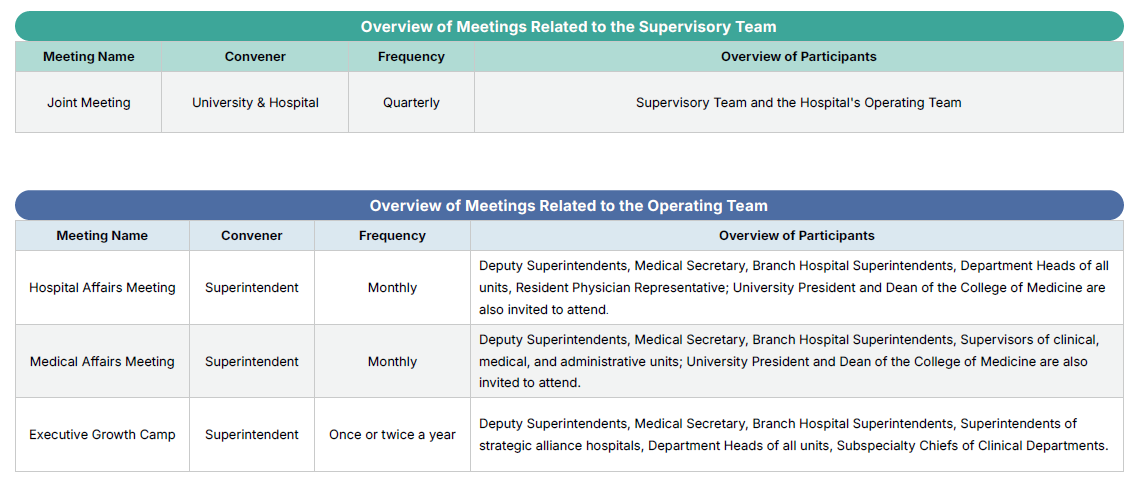

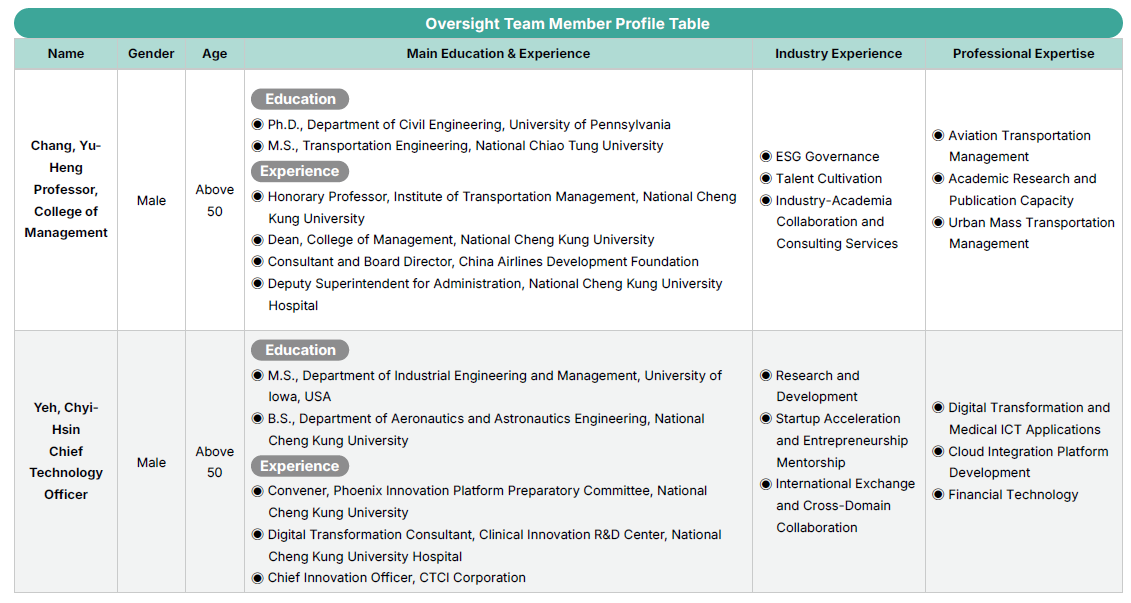
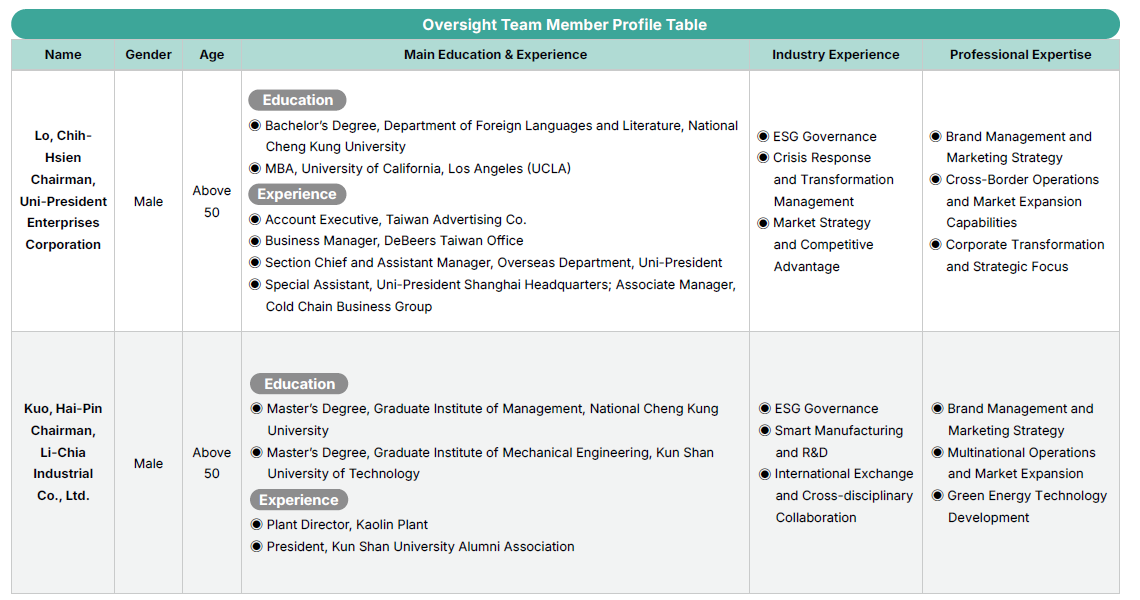

-
Governance Mechanism
To ensure the sustainable development and stable leadership of the hospital, the Hospital has institutionalized procedures for the selection of the Superintendent in accordance with the “Regulations for the Organization of the National Cheng Kung University Hospital,” the “Regulations for the Selection of the Superintendent of National Cheng Kung University Hospital,” and the “Regulations on the Term and Qualifications for Concurrent Appointments of Superintendents, Deputy Superintendents, and Heads of Medical Units in Medical Institutions Affiliated with the Ministry of Education.”
When the position of Superintendent becomes vacant or five months before the term expires, the Dean of the College of Medicine shall convene and form a Selection Committee to begin the selection process. The Selection Committee consists of nine members with diverse backgrounds in school administration, education, and clinical practice to ensure a fair, just, and professionally representative process. In addition, candidates for the Superintendent position must hold a professorship in a College of Medicine and possess a physician’s license issued by the Republic of China. The selection process includes public recruitment, confirmation of nomination intention, interviews, and comprehensive evaluation. Evaluation criteria include clinical education philosophy, administrative coordination capabilities, hospital management abilities, service performance, moral integrity, and health status. The Dean of the College of Medicine shall recommend the final candidate to the University President for appointment.
The term of office and related management systems of the Superintendent are critical elements for decision-making continuity and organizational stability, forming the core of hospital governance. National Cheng Kung University Hospital follows institutional regulations that clearly define the Superintendent’s term of office, reappointment conditions, and dismissal procedures. These rules balance leadership flexibility with oversight mechanisms to strengthen the governance framework and ensure sound organizational operations and clear accountability. Key points are summarized below:

Four Deputy Superintendents are additionally appointed to assist in hospital affairs. The Superintendent shall recommend qualified candidates to the Dean of the College of Medicine, who will then submit the recommendation to the University President for appointment or concurrent service. The Office of the Superintendent leads the management team annually in formulating the hospital’s strategic objectives, short-, mid-, and long-term development plans, institution-wide quality improvement, and patient safety plans. These initiatives are aligned with national policies to promote bidirectional referral systems, elevate regional medical standards, and implement the goal of a hierarchical medical care system.

-
Performance and Compensation
As a public medical institution, the salary structure of NCKU Hospital follows the operational procedures outlined in the “Personnel Expenses – Salary Integration Examples across Functions” issued by the Directorate-General of Budget, Accounting and Statistics, Executive Yuan. Statutory remuneration for civil servants is handled in accordance with the “Civil Servant Pay Act,” the “Regulations for Civil Servants' Allowances and Remuneration,” and the “Guidelines for Remuneration of National Military, Civil, and Teaching Staff” promulgated by the Executive Yuan.
Additionally, bonuses are granted in accordance with the “Guidelines for Incentive Bonuses of Hospitals Affiliated with National Universities under the Ministry of Education.” Profit-sharing bonuses are issued based on operational performance, and the Hospital has established separate operational regulations for performance incentive bonuses to ensure the principles for bonus disbursement are clearly.
-
Sustainable Development Committee
In active response to Taiwan’s 2050 Net Zero Emissions policy and the SDGs, NCKU Hospital established the Sustainable Development Committee in January 2025. The Committee analyzes sustainability issues related to governance, environmental, and social aspects, aligning these with the Hospital’s operational core, research innovation, and medical services to formulate strategic directions and implement key projects.
The Committee comprises 19 members, mainly drawn from department heads and designated personnel within the Hospital, covering diverse fields to ensure comprehensiveness and professionalism in policy planning and implementation. The President of the Hospital serves concurrently as the Chairperson, and a Vice President appointed by the President serves as Vice Chairperson. The Director of the General Affairs Office and the Director of the Construction and Maintenance Office serve as ex-officio members. Other committee members are appointed from heads of relevant departments. Additionally, one Executive Secretary and several officers are designated to coordinate all affairs of the Committee.
The Committee’s specific responsibilities are as follows:
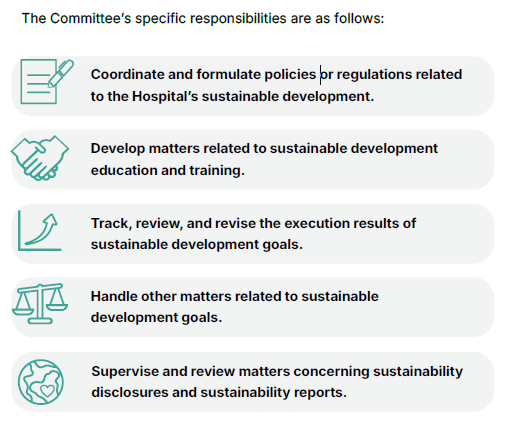
To implement sustainability goals effectively, the Committee has established the “Sustainable Development Promotion Office” (hereinafter referred to as the Sustainability Office) and formed several task forces. These task forces are intended to stay aligned with global sustainability trends and analyze governance, environmental, and social issues in depth. Based on the core of medical services and integrating innovative thinking and service delivery models, the Committee formulates strategic sustainable development goals and implements project plans.
Six major task forces are formed based on the nature of their functions: “Sustainable Governance,” “Excellence in Healthcare,” “Risk Response,” “Happy Workplace,” “Social Participation,” and “Sustainable Environment.” Each task force is led by a designated leader and supported by sustainability managers, all appointed by the Hospital President.
In the future, the Hospital’s sustainability report and greenhouse gas inventory report will be proposed during the inter-departmental management meetings at the University’s main campus and disclosed externally upon approval, further enhancing overall sustainability governance performance.
